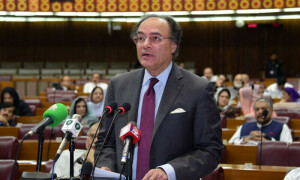SINCE the announcement of the ceasefire on May 10, Pakistan has more than once reiterated its willingness to engage in dialogue with India. However, New Delhi has yet to respond in kind, reinforcing the perception that it remains averse to meaningful engagement. In response to US President Donald Trump’s offer to mediate on the Kashmir issue, India firmly rejected third-party involvement. Indian External Affairs Minister S. Jaishankar maintained that all matters between India and Pakistan would be addressed bilaterally, a position that leaves little room for external facilitation.
India’s growing economic stature has undoubtedly enhanced its international profile. Yet, its recent confrontations with Pakistan, alongside developments in its immediate neighbourhood, have served as a sobering counterpoint to the prevailing ultranationalist mindset within the country. Just a year earlier, India experienced a diplomatic setback when a friendly government in Bangladesh was overthrown amid a violent uprising. These back-to-back challenges have exposed vulnerabilities in India’s regional policy and raised questions about the current leadership’s capacity to manage complex relationships with its neighbours.
The inability to cultivate stable ties within the region undermines India’s diplomatic standing and tempers the expectations of those in the West who view New Delhi as a strategic counterweight to Beijing. For many observers, these developments offer a more grounded assessment of India’s regional influence and the limits of its current foreign policy trajectory.
Pakistan has never denied engaging in dialogue with India, both directly and through backchannel mechanisms. At present, communication at the level of the directors general of military operations continues as part of efforts to uphold the ceasefire agreement. Yet, the prevailing mood in New Delhi remains unyielding, with little indication of interest in reviving either a comprehensive or composite dialogue process. This reluctance is largely shaped by the political cost of any engagement that places Kashmir on the agenda, a prospect the current Indian government appears keen to avoid, especially following its unilateral revocation of Indian-occupied Jammu and Kashmir’s special status on Aug 5, 2019.
Saarc has historically served as a platform to facilitate engagement between India and Pakistan.
Islamabad is open to discussing all issues, including terrorism, as long as Kashmir is included in the talks. However, there are growing indications that New Delhi may attempt to reshape the contours of future engagement. One emerging tactic appears to be the instrumentalisation of the Indus Waters Treaty. By signalling an unwillingness to engage further in this long-standing framework, India may be seeking to limit the agenda of any prospective dialogue to two narrow points: terrorism and water, effectively excluding Kashmir.
This approach suggests a strategic recalibration by India, aiming to redefine the bilateral discourse in a manner that neutralises Pakistan’s core concerns. However, such a limited framework is unlikely to yield sustainable peace or regional stability, as it overlooks the centrality of the Kashmir dispute in South Asia’s security calculus.
The global community has increasingly voiced concern over the enduring tensions between India and Pakistan, warning that the conflict has the potential to escalate into a nuclear flashpoint. There have been repeated calls for the global leadership to play a more proactive role in de-escalating tensions between the two neighbours. Pakistan has consistently highlighted the risks the unresolved dispute poses, reinforcing the perception that peace in South Asia remains precarious. While President Donald Trump offered to mediate, only a handful of Western and Gulf states have actively tried to nudge both sides towards dialogue. In contrast, most regional countries have remained conspicuously silent, despite their significant potential to contribute to peacebuilding.
South Asian nations could play a transformative role by reviving the long-dormant South Asian Association for Regional Cooperation. While not a forum for resolving bilateral disputes, Saarc has historically served as a platform to facilitate engagement between India and Pakistan. A notable example was the breakthrough at the 2004 Islamabad summit, where the Vajpayee-Musharraf handshake on the sidelines catalysed the composite dialogue process. Such moments underscore the forum’s potential. However, India’s ruling BJP government has increasingly sidelined Saarc, offering alternative platforms such as the Bay of Bengal Initiative for Multi-Sectoral Technical and Economic Cooperation, known as BIMSTEC, which have largely failed to gain similar traction or produce tangible results.
South Asia offers vast trade and connectivity opportunities, as well as geopolitical strength vital to the entire region’s foreign policy interests. The Indian experiment for alternative regional groupings has not produced the desired results and has only shown fragmented diplomatic efforts. There is now a chance for the South Asian leadership to come forward and play an active role.
Pakistan’s regional standing has also subtly improved in recent months. The political transition in Bangladesh, a founding proponent of Saarc, has opened new possibilities for regional cooperation. During a meeting in December last year in Cairo between Prime Minister Shehbaz Sharif and Bangladesh leader Dr Muhammad Yunus, the latter remarked: “I am a big fan of the idea of Saarc. I keep harping on the issue. I want a summit of Saarc leaders, even if it is only for a photo session, because that will carry a strong message.”
Saarc has not held its biennial summit since 2014. The 2016 summit, scheduled to take place in Pakistan, was indefinitely postponed after India, Bangladesh, Bhutan and Afghanistan declined to participate. However, the strategic landscape has since shifted, particularly following changes in leadership in Afghanistan and Bangladesh. The conditions are now more favourable for Saarc to resume its role as a regional dialogue and cooperation forum. Pakistan now possesses the diplomatic strength to engage constructively with its South Asian counterparts, and the response from regional partners is likely to be encouraging rather than disappointing.
While India may continue to resist the idea of a summit in Islamabad, hosting it in a neutral member country remains a viable option. Even if such a summit does not yield immediate breakthroughs, it would signal a renewed commitment to regionalism, something South Asia desperately needs.
The writer is a security analyst.
Published in Dawn, May 18th, 2025












































